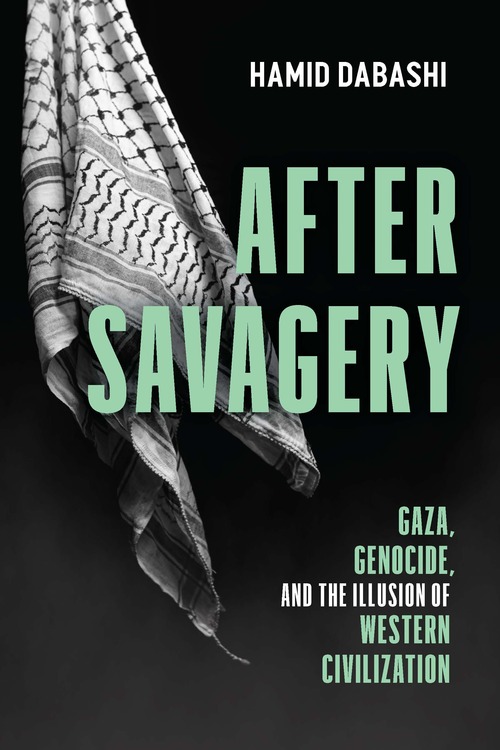by KIM PETERSEN

A review of Hamid Dabashi’s After Savagery
“But the state of Israel was not created for the salvation of the Jew; it was created for the salvation of Western interests.”
— James Baldwin, “Open Letter to the Born Again” (September 29, 1979). Quoted in Hamid Dabashi, After Savagery: Gaza, Genocide, and the Illusion of Western Civilization (Haymarket Books, 2025): 159.
Baldwin’s assessment is shared by many others, such as Noam Chomsky, who discussed in his book (The Fateful Triangle, 1999 edition) Israel’s role as a “strategic asset.” (p. 69, 70, 103, 137) However, others, such as Jean Bricmont and Diana Johnstone countered that assessment in a 2024 article, “The Myth of Israel as ‘US Aircraft Carrier’ in Middle East.” They write:
But the crucial evidence, totally missing from their analysis, is the slightest example of Israel actually serving American interests in the region.
If no examples are given, it’s simply because there are none. Israel has never fired a shot on behalf of the United States or brought a drop of oil under U.S. control.
We can start with a common sense argument: If the U.S. is interested in Middle East oil, why would it support a country that is hated (for whatever reasons) by all the populations of the oil producing countries?
Bricmont and Johnstone attribute the unstinting US support of Israel as being influenced by money injected into the US political arena by the Jewish lobby, in particular AIPAC.
The question of which side leads in determining US support for Israel is debatable. What is indisputable is that the US and Israel are in lockstep despite all the violations of international law by Israel (US is a serial violator of international law, as well), despite several massacres carried out by Israel, and despite the mightily ramped up genocide being perpetrated by Israeli Jews against Palestinians currently.
Genocide and the understanding of what unleashes the bloodshirtiest of human actions is the subject of Hamid Dabashi’s After Savagery, scheduled for release by Haymarket Books on 30 September — while the savagery is ongoing. The urgency for a worldwide response calls for informing those unaware or those insouciant to the Jewish Israeli genocide that is being perpetrated on Palestine (It is not just a genocide in Gaza, as a 1 July 2025 Al Jazeera headline makes clear: “Israel has killed 1,000 Palestinians in the West Bank since October 7, 2023.”). After Savagery, however, is not just about the genocide in Gaza, it is about why some humans commit genocide. So After Savagery is also about “before savagery.” What are the conditions that lead to savagery today. And most importantly, how genocide can be prevented from happening.
Dabashi quotes many sources to attest to the genocide that is happening now in Palestine.
“What we are seeing in Gaza is a repeat of Auschwitz,” says the Burmese genocide expert and Nobel Peace Prize nominee Maung Zarni. “This is a collective white imperialist man’s genocide,” he further explains. (154-155)
Asked to describe what he witnessed in Gaza, Dr. Perlmutter replied, “All of the disasters I’ve seen, combined—forty mission trips, thirty years, Ground Zero, earthquakes, all of that combined—doesn’t equal the level of carnage that I saw against civilians in just my first week in Gaza.” And the civilian casualties, he said, are almost exclusively children. “I’ve never seen that before,” he said. “I’ve seen more incinerated children than I’ve ever seen in my entire life, combined. I’ve seen more shredded children in just the first week … missing body parts, being crushed by buildings, the greatest majority, or bomb explosions, the next greatest majority. We’ve taken shrapnel as big as my thumb out of eight-year-olds. And then there’s sniper bullets. I have children that were shot twice.” (103-104)
“Yes, it is genocide,” has affirmed Amos Goldberg, a professor of Holocaust history at the department of Jewish history and contemporary Jewry at the Hebrew University of Jerusalem: “It is so difficult and painful to admit it, but despite all that, and despite all our efforts to think otherwise, after six months of brutal war we can no longer avoid this conclusion.” (142)
Dabashi traces the roots of Zionism to a longstanding settler-European colonialism. And the author lays bare the insidiousness of Zionism and how this racism impacted Palestinians:
Today, the birth of Palestine as a “question” rather than a nation-state marks precisely the birth of Palestine as a constellation of refugee camps. The land was stolen from Palestinians, the state stealing the land was a European settler colony garrison state that rules over Palestinians with cruelty, the rules for the inscription of life were dictated to Palestinians in draconian terms, and the camps as the fourth inseparable element are precisely where generations of Palestinians are born and raised, before being killed by the Israeli military. (127-128)
Part of this racism towards Muslims, of which the majority of Palestinians are, is the use of the term “Muselmann[1].” Writes Dabashi, “This is perhaps a mini encyclopedia of European ignorance, Islamophobia and antisemitism all wrapped up in an attempt to unpack the word ‘Muselmann,’ but in fact loading it with more racist dimensions.” (120) And the new Muselmann, is the Palestinian, “the Untestifiable, the human animal, as Israeli warlords have said.” (xxvi)
Dissident Voice for more
